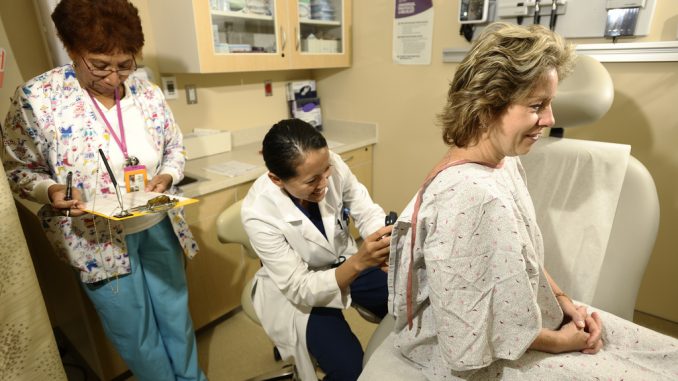

What are the risks and benefits of getting an annual checkup from your doctor?
Physicians and patients have come to expect the annual checkup as a routine part of care.
“However, considerable research has not demonstrated a substantial benefit,” notes a discussion paper published in the Annals of Internal Medicine. The result is a revolt against the tradition of the periodic checkup. “Even the Society for General Internal Medicine advised primary care physicians to avoid ‘routine general health checks for asymptomatic adults,’” the paper notes.
As I discuss in a video made on this topic, routine checkups do seem to make sense. But, historically, medical practice has included all sorts of interventions that seemed to make sense, but were later to have significant side effects. One example is hormone replacement therapy for menopause, which was later found to increase risks of breast cancer, blood clots, heart disease, and stroke.
“History repeatedly shows that good intentions and ‘common sense’ kill in the name of prevention (for example, prone sleeping recommendation for infants),” notes an article on health checkups in the UK. published in BMJ Clinical Research in February 2015.
Indeed, doctor advice led to the death of some infants by making the so-called common-sense recommendation that infants sleep on their tummies. We now know sleeping face up is safer and public health campaigns tell parents “Face Up to Wake Up.”
“We should always demand evidence rather than succumb to delusion,” the BMJ article notes.
We have been told to check our cars regularly, so why wouldn’t we apply the same principle to our bodies. Well, unlike cars, our bodies have self-healing properties. To see if the benefits outweigh the harms, Danish researchers did a meta-analysis of available research on the topic in 2019.
“What are the benefits and harms of general health checks for adult populations?” they asked. After reviewing 17 trials, they concluded that “Health checks have little or no effect on total mortality” and that checkups were “not associated with lower rates of all-cause mortality, mortality from cardiovascular disease, or mortality from cancer,” meaning they weren’t associated with living longer or a lower risk of dying from heart disease, stroke, or cancer.
It turns out, general checkups have a side effect. While they may not reduce disease rates or death rates, they do increase the number of new diagnoses and those diagnoses can have their own consequences.
“Harmful effects of some tests and subsequent treatment could have balanced out possible beneficial effects of others,” the researchers concluded.
In an earlier analysis the same researchers did in 2012 that looked at 16 prior studies, they found possible harms from checkups included “overdiagnosis, overtreatment, distress or injury from invasive follow-up tests, distress due to false-positive test results, false reassurance due to false-negative test results, possible continuation of adverse health behaviors due to negative test results, adverse psychosocial effects due to labeling, and difficulties with getting insurance.”
Take diabetes, for example. Wouldn’t it be great if we detected cases of diabetes earlier? Perhaps not, if you were one of the people given Avandia, the No. 1 diabetes drug that was then pulled off the market because instead of helping people, it appeared to be killing them. Adverse drug events are now one of our leading causes of death. When it comes to lifestyle diseases like Type 2 diabetes, maybe we should focus instead on creating healthier food environments. This is what one of my favorite organizations, Balanced, does to help prevent the diabetes epidemic in the first place.
How many times have you tried to inform someone about healthy eating and evidence-based nutrition, only to have them say, “No, I don’t have to worry. My doctor reassured me I’m fine. I just had a checkup, and everything’s normal.” As if having normal cholesterol is okay in a society where it’s normal to drop dead of a heart attack, the number one killer of men and women. It would be one thing if you went to see a lifestyle medicine doctor who spent the checkup giving you the tools to prevent 80 percent of chronic disease, but given the way medicine is currently practiced, it’s no wonder why the history of routine checkups “has been one of glorious failure, but generations of well-meaning clinicians and public health physicians struggle to allow themselves to believe it.” But, “policy should be based on evidence …”
As an editorial in the British Medical Journal proclaims: “The history of health promotion through routine health checks has been one of glorious failure, but generations of well-meaning clinicians and public health physicians struggle to allow themselves to believe it.”
Another editorial in The Medical Clinics of North America warns diet may be “on par with tobacco smoking as the most common actual causes of death,” yet the medical profession is inadequately trained in nutrition. Worse, nutrition education in medical school appears to be declining. If you can believe it, there is actually a “shrinking of formalized nutrition education” among health professionals, reports the Journal of Parenteral and Enteral Nutrition.
That means that despite overwhelming research indicating that proper nutrition is the most critical component to healing the leading causes of death in our time, doctors don’t have the education to understand it, let alone prescribe it.
For many people facing disease or illness, the most trusted source of information is their doctor, but that potential education is sharply limited.
“And screening appointments should not be regarded as a form of ‘health education,’”an editorial reads in Maturitas, which absorbed the European Menopause Journal. “People who are obese know very well that they are, and if we have no means of helping them … then we should shut up.” Well, if you really have nothing to say that will help them, maybe you should shut up, especially doctors who have not been taught what constitutes a ‘healthy’ diet—although everyone should know that veggies, fruit, and nuts are a good start.
Won’t a checkup allow your physician to do a comprehensive physical exam and routine blood testing? That depends, as does the value of that testing. Patients may want that testing, but it often does little more than making the patient feel better. Unfortunately, many tests are more likely to indicate false positives and set the patient on the course to unnecessary treatment and additional tests.
For most people, what they really need from their doctor visit is a meaningful treatment of lifestyle medicine.
This is an exciting growing field of medicine aimed at treating the causes of disease. If your doctor seems uninterested, visit NutritionFacts.org to learn more about it in our video “Convincing Doctors to Embrace Lifestyle Medicine.” If you are looking for a doctor, make sure he or she is a member of the American College of Lifestyle Medicine—and even better if they are certified by the American Board of Lifestyle Medicine.
And for your own sake, continue to learn more about why an ounce of prevention is worth a ton of cure. Unfortunately, physicians and patients alike wildly overestimate the benefits of pills and procedures due to limited understandings about the actual benefit of diet versus treatments with drugs.
The fact is physicians may be missing their most important tool.
Michael Greger, MD, FACLM, is a physician, New York Times bestselling author, and internationally recognized professional speaker on a number of important public health issues. He has lectured at the Conference on World Affairs, the National Institutes of Health, and the International Bird Flu Summit, testified before Congress, appeared on “The Dr. Oz Show” and “The Colbert Report,” and was invited as an expert witness in defense of Oprah Winfrey at the infamous “meat defamation” trial. This article was originally published on NutritionFacts.org






Be the first to comment